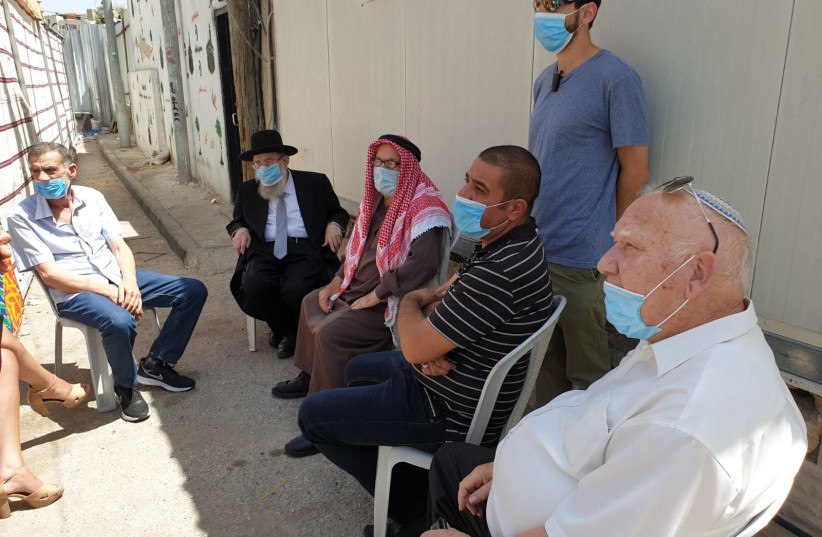The trial of a policeman for the mistaken shooting and killing of east Jerusalem special-needs resident Iyad Halak on May 30, 2020, opened on Sunday in the Jerusalem District Court.
The Police Investigations Department (PID) filed an indictment against the policeman, whose name is under gag order, in June 2021 for second-degree murder, something it had hinted at as early as October 2020.
The shooting of Halak led to massive criticism of the police, and then-prime minister Benjamin Netanyahu admitted it was a mistake.
The question had been whether the PID would decide to indict the police officer who killed Halak for murder, manslaughter or negligent homicide, or even close the case, based on how reasonable or unreasonable it was for the shooter to believe the unarmed Halak was a threat.
While there is no exact equivalent between Israeli and US law, the charge is closest to second-degree murder, a charge that was only created in Israel in July 2019.

The idea of the new charge was that there were too many cases where some kind of extenuating circumstance prevented prosecutors from filing a charge of premeditated murder. But dropping down to the much lighter charge of manslaughter seemed to be too lenient.
The Israeli second-degree murder charge can carry up to 12 years in prison.
Halak was shot dead after fleeing into a garbage disposal room, bolstering the idea that the shooting was far more than a mere negligent mistake.
According to the indictment, because of his special needs, Halak had exhibited suspicious body language that seemed to justify some kind of law-enforcement action, given that the officers did not know he had special needs.
Until the final decision, there was speculation that the policeman who killed Halak might be dealt with leniently since the original police unit that saw him identified him as a terrorist and because the policeman saw his commander try to shoot at Halak while chasing him.
When Halak fled the Lion’s Gate area, groups of police officers followed him with the understanding that he had been flagged as a terrorist by another officer over the police communications system.
One officer said as they ran several blocks to catch Halak, he even fired at his lower body to try to prevent him from getting away. Those shots apparently missed.
However, when this police officer arrived at the garbage room and saw the other police officer – who eventually killed Halak and was charged – standing over Halak, a Justice Ministry statement in October 2020 said he ordered the other officer twice not to fire.
The statement said the shooter ignored both orders, one coming before the first shot and one coming after it.
The indictment was vaguer about the first shot, but it clearly indicated that the second shot, which was the lethal one, was completely unjustified.
In contrast, the police officer who killed Halak has said he did not hear any order to hold his fire.
In addition, according to the policeman’s lead defense lawyer, Lt.-Col. (res). Efrat Nahmany-Bar, none of the other six bystanders in the area of the shooting heard any order for him to hold his fire.
Next, the police officer said he had heard that Halak was declared a terrorist and that he was armed with a gun.
Further, he had seen his commander fire at him, and missed, as they were chasing him down the street.
Moreover, the policeman believed that Halak’s suspicious movements after being shot indicated he was making a move to pull out a weapon, in which case he could have fired at the policeman and the other bystanders from a distance.
The PID’s decision indicated that either it did not believe the shooter or found that his actions were too far beyond what was reasonable under the circumstances.
The department said Halak had presented no danger, that the shooter had been clearly ordered not to fire and that he fired in a deadly manner without cause.
The reason that the policeman who killed Halak is not being charged with first-degree murder is the unique operational circumstances in which he believed he was shooting a terrorist and thought, however unreasonably, that he was upholding public safety.
However, Nahmany-Bar on Sunday told the court the same unique circumstances should have led to dropping any charges against him. She also took the PID to task for failing to consult with the IDF legal division about whether the unique operational circumstances should lead to closing the case.
If the PID had consulted the IDF legal division, it would have been told about other similar gray operational cases that were dropped, Nahmany-Bar, Col. (res.) Sharon Zagagi-Pinhas and lawyer Along Porat said.
Protesters, including Halak’s mother and father, demanded justice against the policeman and encircled the courthouse on Sunday.
They said the circumstances were so blatant that Israel should not be praised for charging the policeman with the equivalent of second-degree murder.
Supporters of the shooter have said the Lion’s Gate in the Old City, where the incident occurred, has seen many attacks by east Jerusalem and West Bank Palestinian residents against police officers.
Religious Zionist Party MK Itamar Ben-Gvir and other protesters went to the courthouse to support the policeman on Sunday.
Halak’s mother, Rana, fainted during a verbal confrontation with some of the pro-policeman protesters.
The policeman’s mother said she has spent decades working with autistic children, adding that her son knows all about special needs and would never have shot Halak had he known the full circumstances.
